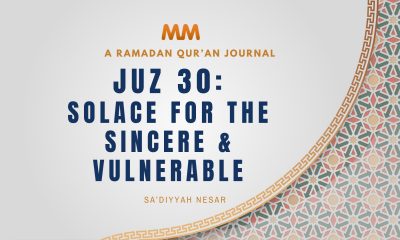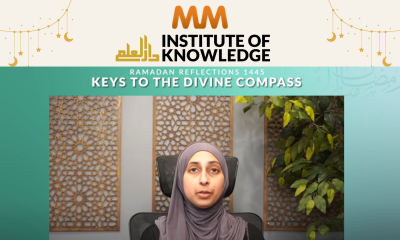Aqeedah and Fiqh
Ramadan Seminar – Moonsighting and Taraweeh
Keep supporting MuslimMatters for the sake of Allah
Alhamdulillah, we're at over 850 supporters. Help us get to 900 supporters this month. All it takes is a small gift from a reader like you to keep us going, for just $2 / month.
The Prophet (SAW) has taught us the best of deeds are those that done consistently, even if they are small. Click here to support MuslimMatters with a monthly donation of $2 per month. Set it and collect blessings from Allah (swt) for the khayr you're supporting without thinking about it.
-
#Islam2 weeks ago
IOK Ramadan: 7 Qualities of Highly Effective Believers | Keys To The Divine Compass [Ep18]
-
#Islam2 weeks ago
IOK Ramadan: Choose Wisely | Keys To The Divine Compass [Ep15]
-
#Islam2 weeks ago
IOK Ramadan: Shake the Trunk of the Tree | Keys To The Divine Compass [Ep16]
-
#Islam2 weeks ago
IOK Ramadan: Good and Bad are Tests from Allah | Keys To The Divine Compass [Ep17]










ibnabeeomar
September 13, 2008 at 1:51 AM
i enjoyed the iftar party part :)
Abu Zayd
September 14, 2008 at 11:22 AM
As-salamu ‘alaykum
After listening to the audio on Tarawih, I am astounded by the level of respect, fairness, and justice in talking about the varying opinions. That is just so rare to see in this day and age.
So Jazakallahu khayran!
Just a couple of points:
1. Where does the word Tarawih come from? I do not see it mentioned in the Qur’an or Ahadith?
2. Is it agreed upon that Tarawih is better to be prayed in congregation? I have found the following to suggest otherwise:
a) The the context of the hadith “… o you people! offer this prayer at your homes, for the best prayer of a person is the one which he offers at home, except the compulsory (congregational) prayer.” [Sahih al-Bukhari, volume 8, book 73, number 134] – this is in actual fact in relation to Tarawih.
b) Professor Dr. Muhammad Rawas (who is professor in one University of Saudia and has compiled a big Encyclopedia upon Fiqh of Sahaba and other early Ulama) writes about Abdullah Ibn Umar: “Abdullah Ibn Umar (the son of Umar Ibn Khattab) did not pray Tarawih with people in Mosque, but he used to offer them individually at home.” [Encyclopedia of Fiqhs, vol 7 (Under Fiqh of Abdullah Ibn Umar)]
c) This same Saudi Professor writes further in his Fiqh Encyclopedia: “One person came to Abdullah Ibn Umar and asked if he should pray Tarawih behind an Imam. Abdullah Ibn Umar asked him if he could recite Quran. He answered: “Yes”. Upon this Abdullah Ibn Umar told him why he want to stand queitly like a donkey behind Imam… Go and offer it at your home.” [Fiqh Encyclopedia, vol 7, under fiqh of “Abdullah Ibn Umar. Authorm Dr. Muhammad Rawas, Professor in Dehran university of Saudia]
d) Al-Nawawi: “The scholars agree on its (Tarawih) merit, but they differ on whether it is better to pray it in one’s home individually or in congregation in a mosque.” Al-Nawawi, the famous commentator of Sahih Muslim, then goes on to list scholars who support the second view. He then writes: “Malik, Abu Yusuf, some Shafi’i scholars, and others say that it is better to pray it individually in the home“. [al-Nawawi, Sharh Sahih Muslim, volume 6, page 286]
e) Once Abdullah bin Mas’ud asked the Prophet (s): “Which is better; to pray in my house or in the mosque?” The Prophet (s) replied: “Do you not see how near to the mosque my house is? To pray in my house is more beloved to me than to pray in the mosque except for the obligatory prayers.” [Ibn Majah, Sunan, volume 1, page 439, number 1378] – and no exception to Tarawih seems to be mentioned.
However some of the above references are quoted from in Shi’a work – I would really appreciate a response.
One last point:
‘O you who believe! do not go near prayer when you are Intoxicated until you know (well) what you say, nor when you are under an obligation to perform a bath– unless (you are) travelling on the road– until you have washed yourselves, and if you are sick, or on a journey, or one of you come from the privy or you have touched the women, and you cannot find water, betake yourselves to pure earth, then wipe your faces and your hands, surely God is Pardoning, Forgiving. [4:43]
Do any scholars say that this verse shows that knowing what is said in Salah is an obligation?
Jazakallahu khayran!
Abu Zayd
Hassan
October 1, 2008 at 1:34 PM
Assalam-o-Alaikum Sheikh Abdul Nasir. Sheikh I have few questions, and specifically since you have deobandi background.
Here in Houston, many independent masajid (not part of ISGH), many of which were deobandi masajid agreed to follow moonsighting in North America rather than calculation. Now can you please tell me what are the process under deobandi maslak to accept shadah?
Because what happened is that two people in Islamic Center of Little Rock Arkansas sighted the moon, one was imam of the masjid, and the other was member of their committee to sight the moon. The sheikh in our masjid called them went through the process of verifying, and alhamdulillah he verified. So he declared eid for yesterday (Tuesday, moon was sighted on Monday night, finishing 29 days of ramadan). He informed ISGH and deobandi community, and neither followed. Many ISGH imams did not fast, and showed infront of people they are not fasting. But deobandi masajid continued fasting. So apparently they were not satisfied with those shahadahas, and nor verification by imam of my masjid. Can you please list the steps that a deobandi use to authenticate sighting? Also one of the reason been used (from a common person) that moonset in that city was 2 minutes before sunset.
Pingback: Rerun: Yasir Qadhi on Understanding the Controversies Regarding Moonsighting | MuslimMatters.org
Yus from the Nati
July 11, 2011 at 3:08 PM
Links are broken.